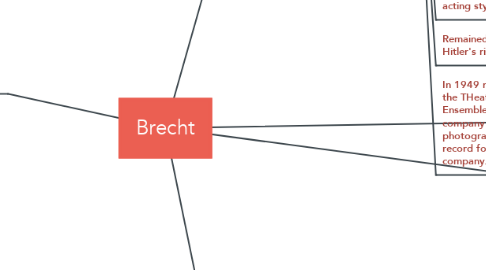Brecht
by Genevieve Camilleri


1. Productions
2. Brooke says: Brecht introduced the idea of an intelligent actor - judging the value of his contribution.
3. Messingkauf Dialogues 1937-1940,
3.1. A Short Organum for the theatre completed in 1948.
4. Context
4.1. By 1918 he had become a rather angry young man.
4.2. At the beginning of WW I he was 16.
4.3. Anger at the way things are: impetus to change the world cannot be divorced from his approach to acting. - Provocation
4.4. Moved to Munich - the cultural capital of Bavaria at the age of 20
4.5. Also influenced by Frank Wedekind who combined writing of plays with performing cabaret - sharpening sense of an audience.
4.6. Post WW I Germany - rise of Communism & Fascism
4.7. Brecht believed: An effective revolution - political/theatrical must be achieved through reason & scientific principle.
4.8. Brecht entered the theatre as a writer - became a practitioner to intervene in the production of his own plays.
4.9. He considered acting style in Germany as hysterical outbursts, paroxysms of uncontrolled roaring and inarticulate anguish. - Melodrama
4.10. Early in his career, he was influenced by Haptmann's and Zola's emphasis on Naturalism
4.11. He observed directors like Max Reinhardt & other Berlin directors work in rehearsal before he attempted to direct professional actors himself. (1921)
4.12. 1922 he was invited to direct the newly formed Junge Buhne. His scathing remarks towards actors lost him the job
4.13. 1923 he returned to Munich wiser: to contribute rather than dictate during the rehearsal of this first plays Sept 22-Dec 23
4.14. 1923 rise of Nazism in Munich - tear gas released during performance of The Jungle
4.15. Met Helen Weigel in autumn 1923 introduction to Karl Marx and Communism
4.16. Sept 1924 - abandoned Bavaria for Berlin after directing Marlowe's Edward II of England - started to develop epic theatre acting style in this production.
4.17. Remained active in the Berlin theatre till Hitler's rise to power in Feb 1933
4.18. In 1949 returned to East Berlin working with the THeatre Company - The Berliner Ensemble - recorded practice of the theatre company - essays, notes, fragments, photographs...Theaterarbeit (1952) the record for posterity of the work of a theatre company.
5. Exercises
5.1. The Brechtian actor should be open to the study of history, history of the present
5.2. Forced into exile for more than 15 years - Denmark, Sweden, Finland & USA. He developed his theories about acting and the theatre in this period.
5.3. details: compel one to reassess the causes of events previously taken for granted
5.4. B. asked actors to take note of first impressions of a play/part to keep alive the element of surprise.
5.5. actors need to remain surprised by the behaviour of their characters
5.6. Brecht as writer & practitioner - wanted to destabilise facts and question
5.7. He advocated dialectics therefore, one finds contradictions, sometimes inconsistency. Theory is experimented upon through practice.
5.8. Brechtian actor training begins with the observation of the outside world (knowledge- observation) The question mark is the starting point of observation: what? why/ why not? how?
5.9. Almost of all of Brecht's exercises involve actors working together. (Ex1-4) -interdependence
5.10. social heart of an episode -gestus
5.11. contradiction -performing tragic scenes with comic effect - aim to gain new insight
5.12. actors develop a critical attitude towards character- double-agents
5.13. verfremdung: make strange- contradictory juxtapositions - neat folding of clothes disorder in speech. actors present behaviour
5.13.1. drama true to life is pre-requisite
5.13.2. 3 phases of rehearsal:
5.13.2.1. acquainted with character
5.13.2.2. empathy
5.13.2.3. to see the character from the outside, society's standpoint
5.14. aim is to invite the audience to interrogate -why? what governs human behaviour? how can it be changed?
5.14.1. Stanislavski locates explanation for behaviour in the character
5.14.1.1. individual's psychology
5.14.2. Brecht locates explanation for behaviour in circumstance.
5.14.2.1. social transactions of a group/society= moral debate
5.15. Multiple doors
5.15.1. presenting different choicest that could have been made (not...but)
